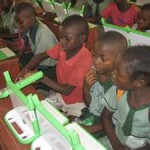Originally posted on January 23, 2012 @ 4:27 am
How will two identical laptops fare in the hands of a child from a highly-developed country and a child from a developing country? For the purpose of easier comparison, let us all think for a while in the line of the advantages associated with the privileged and the limitations related to the less-privileged. A laptop in the hands of a child from the US or UK is probably a necessity in studying. Almost every child of school-age will have one or at least have easy access to one. On the other side of the world particularly in countries like Cambodia or Ethiopia, a laptop is a luxury, falling behind a long list of more pressing necessities such as food, shelter, and clothing.
Given this reality, all children regardless of status in life would want to have equal access to the opportunities presented by technology and whatever advancement it brings. This would probably explain the pictures of joy as seen on the recipients’ faces after receiving their own laptop through the highly-controversial “One Laptop Per Child” or OLPC initiative. After having to share one textbook with at least five other kids in class, is it at all surprising to feel such amazement in having a technological gadget which one can call his/her own?
Children who have automatic access to equipments such as a laptop are not only lucky because of their availability but also because of the prevailing physical convenience around them and the level of support available to them to maximize its use. The same cannot be said for the recipients of the free laptop in a third world country who obviously do not have the capacity and the ability to maximize the use of what they got. Unless a government agency or a non-government organization makes sure that the recipients and the teachers have been properly supported by funding and training, we can be pretty sure that the laptop will just go back straight to the box, never to serve its purpose of education.
Such wasted money for the purchasing country, such wasted learning opportunity for the child.

